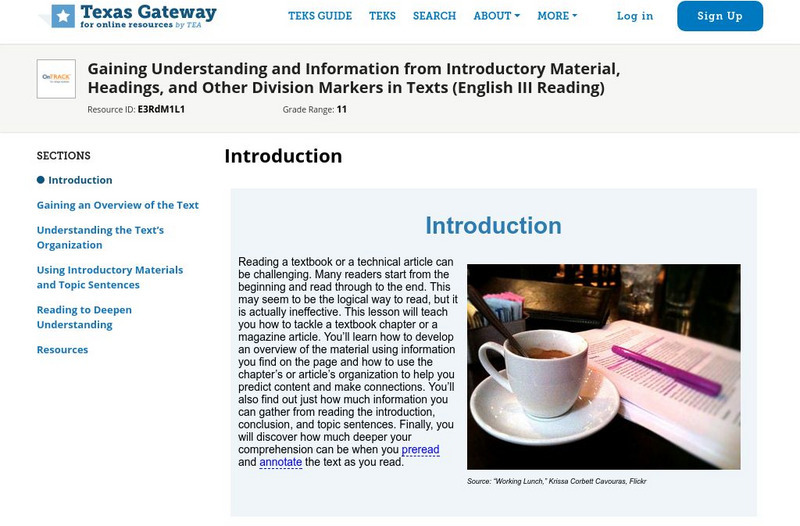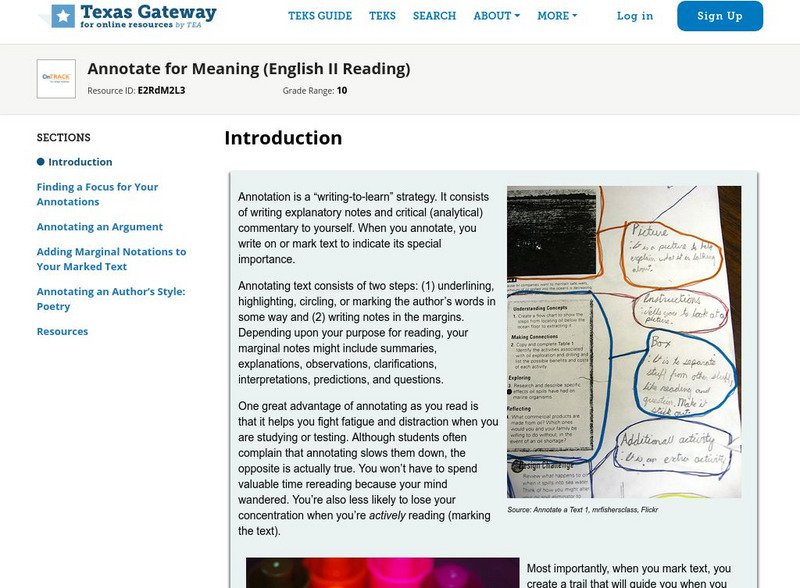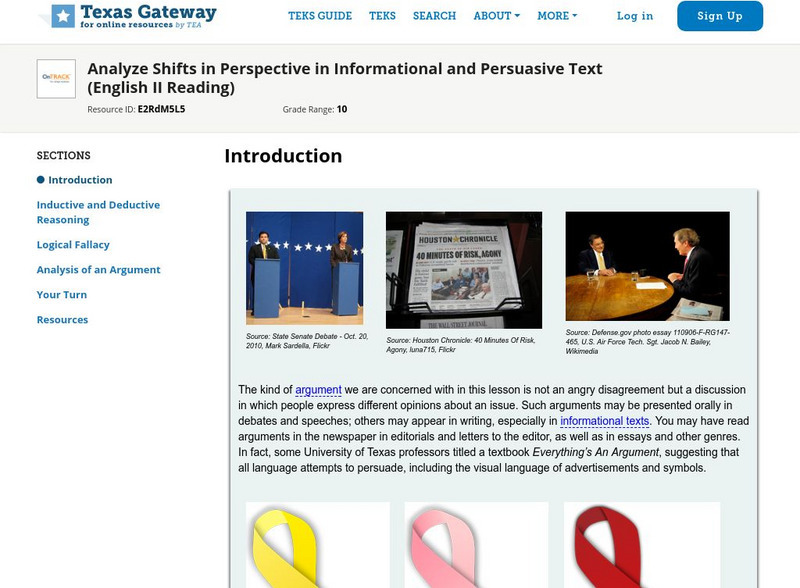Polk Bros Foundation
I Can Locate and Classify Information About a Topic
After reading a text, ask your pupils to recall and organize what they've just learned into a blank three-column chart. Class members write the topic and fill in the columns with information. The sheet also prompts students to write a...
Polk Bros Foundation
I Can Classify Facts and Opinions
Telling fact from opinion can be tricky. Direct your class to practice their reading and comprehension skills by taking notes on the facts and opinions in a text. Pupils fill out a two-column chart and write down how they know a...
Polk Bros Foundation
I Can Analyze a Story or History Completely and Carefully
Start off analysis of a text with a worksheet that asks pupils to complete several tasks. Class members note down a couple of characters or people and their distinguishing traits, describe the most important event, summarize the text...
Polk Bros Foundation
I Can Analyze Cause and Effect
Examine cause and effect by asking pupils to fill out a basic graphic organizer. The template is for any story or event and provides a line for writing in the story or event title. Pupils write in two causes in the circles and the change...
Curated OER
Centers of the Storm: The Lyceum and the Circle at the University of Mississippi
Greek Revival architecture and the Civil Rights Movement? Sure! Examine how the Lyceum and Circle, two historic buildings located on the campus of the University of Mississippi, relate to integration and the 1962 riot on the university...
Southern Nevada Regional Professional Development Program
Common Core Reading Standards: Understanding Argument
What does your class know about logical fallacies? They can find out quite a bit and practice identifying logical fallacies if you follow the steps and use the resources provided here! After reviewing ethos, pathos, and logos, ask small...
Curated OER
Back to the Past
What was the Untied States like in 1938? What were the concerns of Americans in the post World War I era? What were their fears? What were their sources of news and entertainment? To understand the reaction to Orson Welles' radio...
Curated OER
African Americans in California’s Heartland – The Civil Rights Era
Events related to the Civil Rights Movement in Sacramento, California during the 1960s offer class members an opportunity to compare the nonviolent resistance approach favored by Dr. Martin Luther King and the NAACP with those of the...
Curated OER
Human Rights And Civil Rights
While he may not be as well known as civil rights activists such as Mahatma Gandhi, Dr. Martin Luther King, or Malcolm X, Ralph Bunche's contributions certainly made him a leader in the struggle for civil rights in the United States and...
National Endowment for the Humanities
Charles Baudelaire: Poète Maudit (The Cursed Poet)
After learning the main ideas of the Decadent movement, learners work in small groups to read and translate poems by the French poet Charles Baudelaire using basic etymology skills. They then read the accurate English translations to see...
Curated OER
Off the Record
Music reflects culture and culture is reflected in popular music. Reading an article on how hip-hop has affected the lives of two young men of different races launches an investigation of the development and influences of various musical...
Read Works
Read Works: Passages: Predicting the Future
[Free Registration/Login Required] Students read an informational text about the predictions of a futurist and answer questions on comprehension, text support, main idea, vocabulary, and more. Links to a paired text and paired text...
Sophia Learning
Sophia: Annotating Text
This slideshow focuses on the reading strategy, annotating text. It defines the term and purpose, lists types of annotation, explains what to annotate, and suggests how readers develop their own method.
Sophia Learning
Sophia: Critical Reading as a Learning Strategy
This tutorial focuses on critical reading using a downloadable PowerPoint presentation, "Critical Reading 101," which includes separating fact from opinion, 6 propaganda techniques, and 6 common fallacies in reasoning. Also provided is...
Other
Center for Assessment: Tools for Examining Text Complexity [Pdf]
Learn how to use several tools to determine text complexity and readability of text for your students.
CommonLit
Common Lit: "Propaganda: Battling for the Mind" by Shelby Ostergaard
CommonLit.org is a wonderful resource to use in a Language Arts classroom. Each story or article is accompanied by guided reading questions, assessment questions, and discussion questions. In addition, students can click on words to see...
Texas Education Agency
Texas Gateway: Understand Information From Introductory Material, Headings, Etc.
In this lesson students learn how to develop an overview of the material using information gained from text organization to help predict content and make connections. They also to gather information from reading the introduction,...
Texas Education Agency
Texas Gateway: Annotate and Analyze a Paired Passage: Practice 2
[Accessible by TX Educators. Free Registration/Login Required] In this lesson, students will read and annotate a pair of texts to make inferences, draw conclusions, and synthesize ideas and details using textual evidence.
Texas Education Agency
Texas Gateway: Annotate for Meaning (English Ii Reading)
This lesson focuses on annotating text to aid in understanding of the text including annotating an argument and poetry. It also provides tools and techniques for marking text.
Other
Carson Newman College: Close Reading of a Literary Passage [Pdf]
Provides a number of questions that students can ask themselves about a literary passage when doing a "Close Reading" and following this with an organized piece of writing. CCSS.ELA-Literacy.CCRA.R.5
Thinkport Education
Thinkport: Citing Textual Evidence: Changing Oceans
Learn how to cite evidence to support ideas presented in a science article about oceans.
Annenberg Foundation
Annenberg Learner: Analyzing Complex Text
During this lesson, students will use close reading strategies to analyze aspects of the setting in The Adventures of Huckleberry Finn by Mark Twain. [7:57] CCSS.ELA-Literacy.CCRA.R.10, RL.11-12.10a/b Text Complexity
Texas Education Agency
Texas Gateway: Analyze Shifts in Perspective in Informational & Persuasive Text
[Accessible by TX Educators. Free Registration/Login Required] In this lesson, you will read informational texts and identify varying perspectives in different arguments on the same topic. You will also analyze the reasoning and the...
Thinkport Education
Thinkport: Read Like This, Too Central Ideas and Supporting Details
Begin practicing skills that will help identify the central idea and details while reading literary nonfiction.



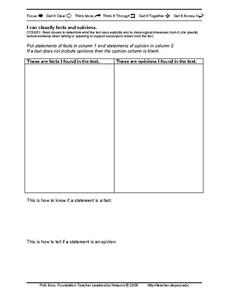





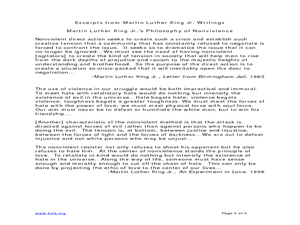




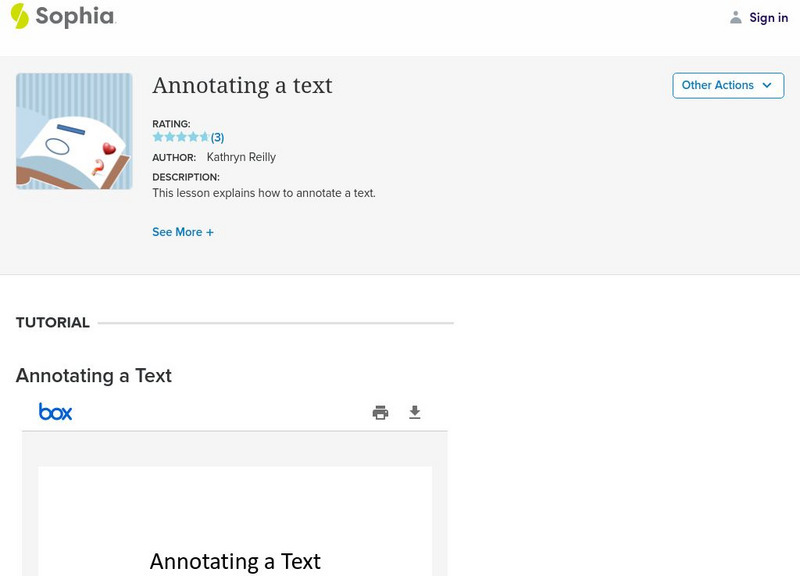

![Center for Assessment: Tools for Examining Text Complexity [Pdf] Professional Doc Center for Assessment: Tools for Examining Text Complexity [Pdf] Professional Doc](https://d15y2dacu3jp90.cloudfront.net/images/attachment_defaults/resource/large/FPO-knovation.png)
